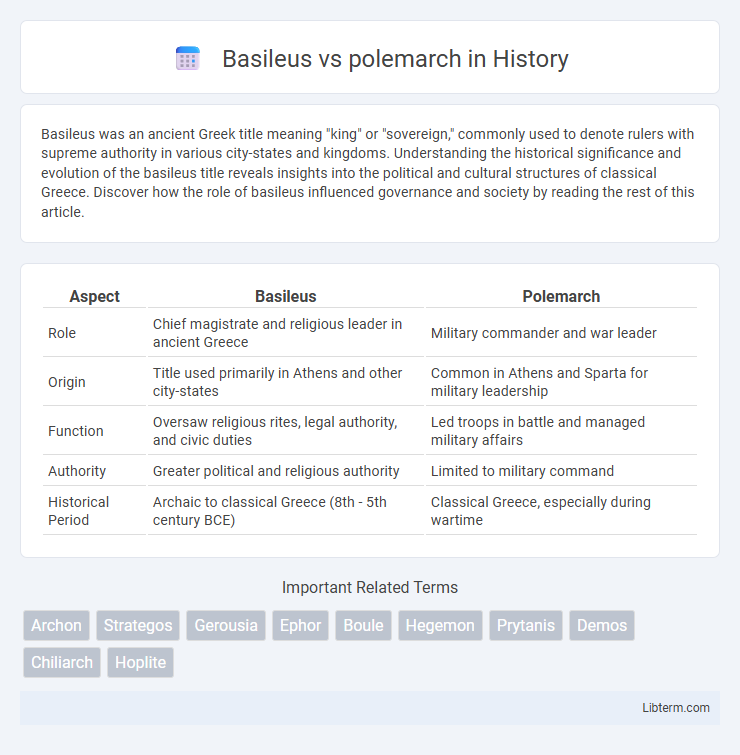Basileus was an ancient Greek title meaning "king" or "sovereign," commonly used to denote rulers with supreme authority in various city-states and kingdoms. Understanding the historical significance and evolution of the basileus title reveals insights into the political and cultural structures of classical Greece. Discover how the role of basileus influenced governance and society by reading the rest of this article.
Table of Comparison
| Aspect | Basileus | Polemarch |
|---|---|---|
| Role | Chief magistrate and religious leader in ancient Greece | Military commander and war leader |
| Origin | Title used primarily in Athens and other city-states | Common in Athens and Sparta for military leadership |
| Function | Oversaw religious rites, legal authority, and civic duties | Led troops in battle and managed military affairs |
| Authority | Greater political and religious authority | Limited to military command |
| Historical Period | Archaic to classical Greece (8th - 5th century BCE) | Classical Greece, especially during wartime |
Introduction to Basileus and Polemarch
Basileus was an ancient Greek title denoting a king or chief ruler with broad political and religious authority, primarily in Mycenaean and archaic Greece. The polemarch functioned as a military commander or war leader, often subordinate to the basileus, responsible for leading troops and overseeing strategic operations. Both roles were pivotal in early Greek city-states, with the basileus focusing on governance and sanctity, while the polemarch specialized in warfare and defense.
Historical Background of Basileus
The Basileus was a key ancient Greek title originally meaning "king" or "sovereign," primarily associated with Mycenaean and classical Greece, where it designated a local monarch or ruler before political power shifted to aristocratic councils and magistrates. Unlike the polemarch, who functioned as a military commander in city-states like Athens, the Basileus held more ceremonial and religious duties, reflecting an earlier era of centralized monarchical authority. This role evolved over time, maintaining religious significance in classical Athens even after political power diminished, illustrating the complex transition from monarchic to republican governance in ancient Greece.
The Role of the Polemarch in Ancient Greece
The Polemarch in Ancient Greece functioned as the military commander and often held judicial authority over metics and non-citizens, distinct from the Basileus who was primarily a religious and ceremonial king. In Athens, the Polemarch played a crucial role in organizing the army and leading troops in battle, reinforcing his status as a key official in warfare and public order. This position reflected the militarized nature of Greek city-states where strategic leadership and legal jurisdiction over non-citizens were essential for maintaining the polis.
Key Responsibilities of a Basileus
The Basileus held supreme authority in ancient Greek city-states, overseeing religious rituals, administering justice, and leading political governance. Unlike the polemarch, whose primary role was military command and strategy, the Basileus was responsible for maintaining civic order and acting as a chief priest during important ceremonies. This role encompassed legal adjudication, sacred duties, and ensuring the welfare of the polis through executive decisions.
Duties and Powers of the Polemarch
The polemarch served as a senior military commander in ancient Athens, responsible for leading the army during wartime and overseeing the organization of troops. This role also included judicial functions, such as adjudicating cases related to metics (non-citizen residents) and matters of war and peace. Compared to the basileus, who handled religious and ceremonial duties, the polemarch's powers were primarily focused on military leadership and enforcing military justice.
Basileus vs Polemarch: Political Authority
The Basileus held supreme political authority in ancient Greek city-states, acting as the chief magistrate with overarching legislative and judicial powers. In contrast, the Polemarch primarily exercised military command and led the armed forces, with limited political influence beyond warfare. The distinction between Basileus and Polemarch highlights the separation of civil governance and military leadership within Greek political structures.
Military Functions: Contrasting Leadership Styles
The Basileus functioned as a supreme military commander, often leading armies personally and embodying centralized authority in warfare decisions. The Polemarch, by contrast, held a more specialized military role, commanding specific troop contingents such as the hoplites and focusing on battlefield tactics rather than overarching strategy. This distinction highlights the Basileus' role in strategic coordination and political leadership, while the Polemarch executed operational command in combat scenarios.
Religious and Social Influence
The Basileus in ancient Greek society held significant religious authority, often presiding over sacred rituals and festivals that reinforced social cohesion and divine legitimacy. In contrast, the Polemarch primarily exercised military leadership but also maintained religious duties connected to war ceremonies and the protection of religious customs. Both roles intertwined governance with spiritual responsibilities, shaping the polis's social order through religious influence and communal identity.
Notable Basileis and Polemarchs in History
Notable Basileis like Pericles of Athens played crucial roles as influential rulers and military commanders during the classical period, guiding their city-states through political and cultural transformations. Prominent polemarchs, such as Miltiades, who led Athenian forces at the Battle of Marathon, exemplify the military leadership and strategic command inherent to the polemarch position in ancient Greek warfare. The distinction between Basileus as a civil and religious leader and polemarch as a military commander highlights the dual governance structure in many Greek city-states.
Legacy and Impact on Greek Governance
The Basileus, as the traditional king, embodied religious and ceremonial authority, shaping early Greek political structures and influencing the evolution of centralized governance. The polemarch, initially a military commander, transitioned into a critical role within the Athenian democracy, reflecting the shift towards more collective and strategic leadership models in Greek city-states. Their legacies highlight the transformation from monarchic rule to complex political systems, underpinning the foundations of classical Greek governance and civic organization.
Basileus Infographic

 libterm.com
libterm.com